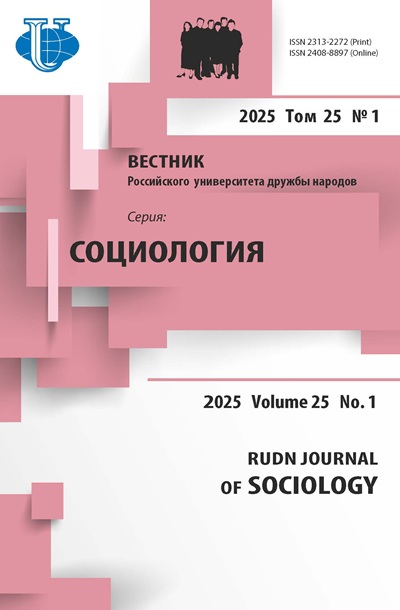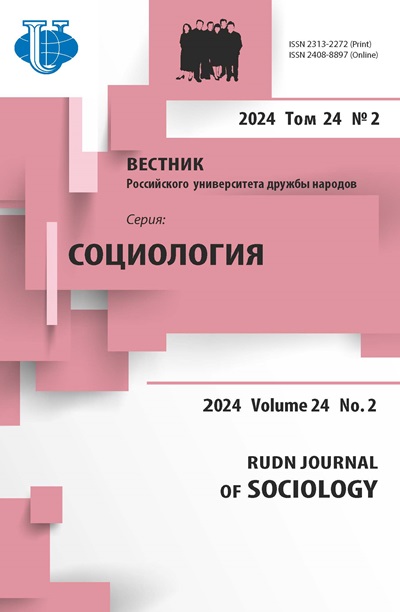Polarization of the information society: Digital reset
- Authors: Dyudikova E.I.1, Kunitsyna N.N.1
-
Affiliations:
- North-Caucasus Federal University
- Issue: Vol 24, No 2 (2024)
- Pages: 539-554
- Section: Sociological lectures
- URL: https://journals.rudn.ru/sociology/article/view/39942
- DOI: https://doi.org/10.22363/2313-2272-2024-24-2-539-554
- EDN: https://elibrary.ru/RJMUPL
Cite item
Full Text
Abstract
The digital singularity, positioned as a complex of sensational, sometimes paradoxical collaborations and innovations, is a stage in the new civilizational structure, which today is beyond human understanding. The contemporary generation becomes a builder and integrator of digital technologies of the sixth order that develops in combination with the metaverse and Web 4.0. Under the current political risks, post-pandemic recovery, sanction pressure, trade and information wars, increasing levels of cyber threats, and internal cosmopolitanization towards a multipolar world, leadership in the cyberspace development and the harmonious development of the information society become decisive for every country. Certainly, contemporary realities require a fundamentally new approach to developing the social-economic space and to ensuring the sovereignty of decisions. The study aims at identifying reasons for social polarization into network and digital segments and principles of the national trusted metaverse in the light of the social-economic space modifications. The authors conducted a study of the social perception of breakthrough innovations and the information and digital revolutions in Russia’s North Caucasus and Southern Federal Districts (N= 21,348). The result of this survey is a polarization matrix of the information society and the concept of its digital transformation under the recursiveness and generativity of intensively complementary and successive innovations. The strategic guideline of this concept is the metaverse in the paradigm of the close connection between economic development and social regulation through the integration of digital space and physical world in the perspective of unique opportunities for the informationcommunication interaction in a single trusted environment based on high-tech solutions of the Web 4.0 era. In the new realities, the digital transformation of the social system is inevitable: the dissonance in the information society’s perception of breakthrough innovations and the results of the information and digital revolutions indicate the inevitability of future changes.
About the authors
E. I. Dyudikova
North-Caucasus Federal University
Author for correspondence.
Email: dudikova.e@gmail.com
Pushkina St., 1, Stavropol, 355017, Russia
N. N. Kunitsyna
North-Caucasus Federal University
Email: nkunitcyna@ncfu.ru
Pushkina St., 1, Stavropol, 355017, Russia
References
- Artyukhin V.V. Informatsionnoe obshchestvo i obshchestvo znanij — realnost, formatsii ili kontseptsii? [Are information society and knowledge society reality, formations or concepts?]. Prikladnaya Informatika. 2007; 6. (In Russ.).
- Beketskaya Yu.M., Osipyan M.M., Terekhova Yu.A., Koshokova S.Ya. Tsifrovoe obshchestvo kak novy etap informatsionnogo obshchestva [Digital society as a new stage of the information
- Bell D. Sotsialnye ramki informatsionnogo obshchestva [The social framework of the information society]. Novaya Tekhnokraticheskaya Volna na Zapade. Moscow; 1986. (In Russ.).
- Bаll M. Metavselennaya: Kak ona menyaet nash mir [The Metaverse: How it changes our world]. Moscow; 2023. (In Russ).
- Wolfson Yu.R, Volchina A.E. Problema klassifikatsii teorij informatsionnogo obshchestva [The difficulty of the information society theories classification]. Sovremennye Issledovaniya Sotsialnyh Problem. 2017; 8 (3). (In Russ.).
- Vorozhikhin V.V. “Obshchestvo 5.0” kak otvet chelovechestva na vyzovy globalnogo razvitiya [“Society 5.0” as humanity’s response to challenges of the global development]. Rossiya: Tendenctsi i Perspektivy Razvitiya. 2019; 14 (1). (In Russ.).
- Genkin A., Mikheev A. Blokchejn dlya vseh: kak rabotayut kriptovalyuty, BaaS, NFT, DeFi i drugie novye finansovye tekhnologii [Blockchain for Everyone: How Cryptocurrencies, BaaS, NFT, DeFi and Other New Financial Technologies Work]. Moscow; 2023. (In Russ.).
- Glazyev S.Yu. Informatsionno-tsifrovaya revolyutsiya [Information-digital revolution]. Evraziyskaya Integratsiya: Ekonomika, Pravo, Politika. 2018; 1. (In Russ.).
- Dobrinskaya D.E., Martynenko T.S. Perspektivy rossijskogo informatsionnogo obshchestva: urovni tsifrovogo razryva [Perspectives of the Russian information society: Digital divide levels]. RUDN Journal of Sociology. 2019; 19 (1). (In Russ.).
- Zhukova M.V., Kryukov D.V. Sovremenny trend razvitiya ekonomiki i obshchestva: tsifrovoe obshchestvo kak osobaya stadiya informatsionnogo obshchestva [Contemporary trend in the social-economic development: Digital society as a special stage of the information society]. Society and Security Insights. 2022; 5 (2). (In Russ.).
- Lisenkova A.A. Novye media: ot Web 1.0 k semanticheskoj pautine Web 4.0 [New media: from Web 1.0 to the semantic Web 4.0]. Vestnik MGUKI. 2018; 1. (In Russ.).
- Negodaev I.A. Na putyah k informatsionnomu obshchestvu [On the Way to the Information Society]. Rostov-on-Don; 1999. (In Russ.).
- Nesterov A.Yu., Doroshin A.V., Nikonorov A.V., Soifer V.A. Evolyutsiya obshchestva v svete filosofii tekhniki [Social evolution in the light of philosophy of technology]. Filosofskie Nauki. 2022; 65 (2). (In Russ.).
- Rasskazov S.V. Rekursivnost v platformah tsifrovogo sotrudnichestva [Recursiveness on digital collaboration platforms]. Politicheskaya Ekspertiza. 2022; 18 (1). (In Russ.).
- Silkina G.Yu., Kutuzov A.L., Shevchenko S.Yu. Intellektualnye tekhnologii perekhoda k intellektualnomu obshchestvu [Smart technologies of transition to the intellectual society]. Nauka i Biznes: Puti Razvitiya. 2022; 5. (In Russ.).
- Smirnov A.V. Tsifrovoe obshchestvo: teoreticheskaya model i rossijskaya dejstvitelnost [Digital society: Theoretical model and Russian reality]. Monitoring Obshchestvennogo Mneniya: Ekonomicheskie i Sotsialnye Peremeny. 2021; 1. (In Russ.).
- Stonier T. Informatsionnoe bogatstvo: profil postindustrialnoj ekonomiki [The wealth of information: A profile of the post-industrial economy]. Novaya Tekhnokraticheskaya Volna na Zapade. Moscow; 1986. (In Russ.).
- Toffler A. Tretiya volna [The Third Wave]. Moscow; 2004. (In Russ.).
- Uemura N. Obshchestvo 5.0: vzglyad Mitsubishi Electric [Society 5.0: The view of Mitsubishi Electric]. Ekonomicheskie Strategii. 2017; 4. (In Russ.).
- Chesnyukova L.K., Kuptsova S.N., Yaroslavtseva N.V. Informatsionnye tekhnologii kak osnova dlya transformatsii v tsifrovoe obshchestvo i industriyu 5.0 [Information technologies as a basis for transformation into a digital society and industry 5.0]. Zametki Uchenogo. 2023; 4. (In Russ.).
- Chudin A.A., Gulyaev S.V. Printsipy postroeniya informatsionnogo obschestva v Rossii i mire [Principles of building an information society in Russia and the world]. Kreativnaya Ekonomika. 2023; 17 (4). (In Russ.).
- Schwab K. Chetvertaya promyshlennaya revolyutsiya [The Fourth Industrial Revolution]. Moscow; 2017. (In Russ.).
- Schiller Н. Manipulyatory soznaniem [Mind Manipulators]. Moscow; 1980. (In Russ.).
- Shchelkunov M.D., Karimov A.R. Obshchestvo 5.0 v tekhnologicheskom, sotsialnom i antropologicheskom izmereniyah [Society 5.0 in technological, social and anthropological dimensions]. Vestnik Ekonomiki, Prava i Sotsiologii. 2019; 3. (In Russ.).
- Arner D., Auer R., Frost J. Stablecoins: Risks, Potential and Regulation. 2020. URL: https:// www.bis.org/publ/work905.pdf.
- Brzezinski Z. Between Two Ages. America’s Role in the Technetronic Era. New York; 1971.
- Bullmann D., Klemm J., Pinna A. In Search for Stability in Crypto Assets: Are Stablecoins the Solution? 2019. URL: https://www.ecb.europa.eu//pub/pdf/scpops/ecb.op230~d57946be3b. en.pdf.
- Dahrendorf R. Class and Class Conflict in Industrial Society. California; 1959.
- Masuda Y. The Information Society as Post-Industrial Society. Washington; 1981.
- Schwab K., Malleret T. Covid-19: The great reset. World Economic Forum. 2020. URL: https:// books.google.ru/books?id=kruwzQEACAAJ.
- Segran E. The Ethical Quandaries You Should Think about the Next Time You Look at Your Phone. 2015. URL: https://www.fastcompany.com/3051786/ the-ethical-quandaries-you-should-think-about-the-next-time-you-look-at.
- Yuneline M.H. Analysis of cryptocurrency’s characteristics in four perspectives. Journal of Asian Business and Economic Studies. 2019; 26 (2).
- Zittrain J. The Generative Internet. Harvard Law Review. 2006; 119.
Supplementary files
There are no supplementary files to display.















